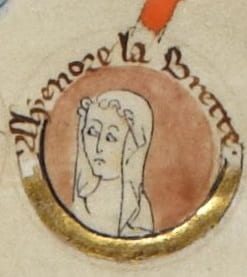
In 1241, a woman of royal descent died in Bristol castle. She was Eleanor of Brittany, granddaughter of one king of England (Henry II), niece of two more (Richard ‘the Lionheart’ and ‘Bad’ King John), and first cousin of the man on the throne at that point (Henry III), not to mention daughter of a duke and duchess of Brittany. She had spent a lot of her last two decades in Bristol, a city on the rise, with an imposing castle, but Eleanor’s prolonged stay here was very much not her own choice.
She had been born between 1182 and 1184, and, with her pedigree, would have expected a big dynastic marriage, life at one of the great courts of Europe, a position of respect as wife and mother, frequent travel, extensive lands, and a life of some influence. None of this happened: she ended up a prisoner of the kings of England for much of her life, a situation which only ended with her death in captivity in Bristol.
Eleanor had not, as far as we know, committed any offence which might justify this unusual treatment, however: she was confined not for what she had done, but for who she was. After the death of her uncle Richard, it might have been argued that the right to the throne of John, and his line, was weaker than that of the children of his older brother, Eleanor’s dead father, Geoffrey. It was in the interests of John and his son Henry III to keep her unmarried and under control, and that is what they did.
Eleanor’s story may strike us as sad, or cruel. Or we may not be moved by her difficulties and disappointments, when we compare them to the sharper suffering of many of her contemporaries: she did, after all, have food to eat and clothes to wear, the occasional royal gift, and lived out a fairly long life. Whatever may be our emotional response, I think that Eleanor’s treatment tells us some important things about women, law and legal history.
